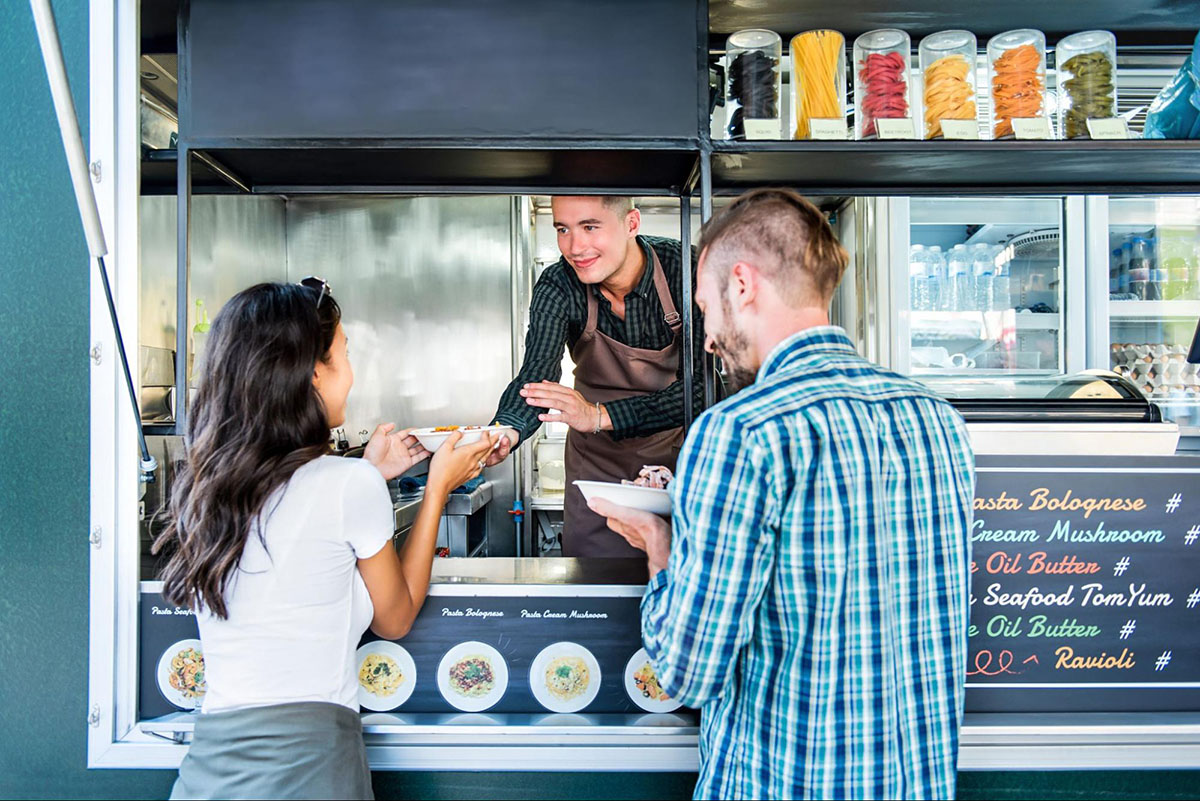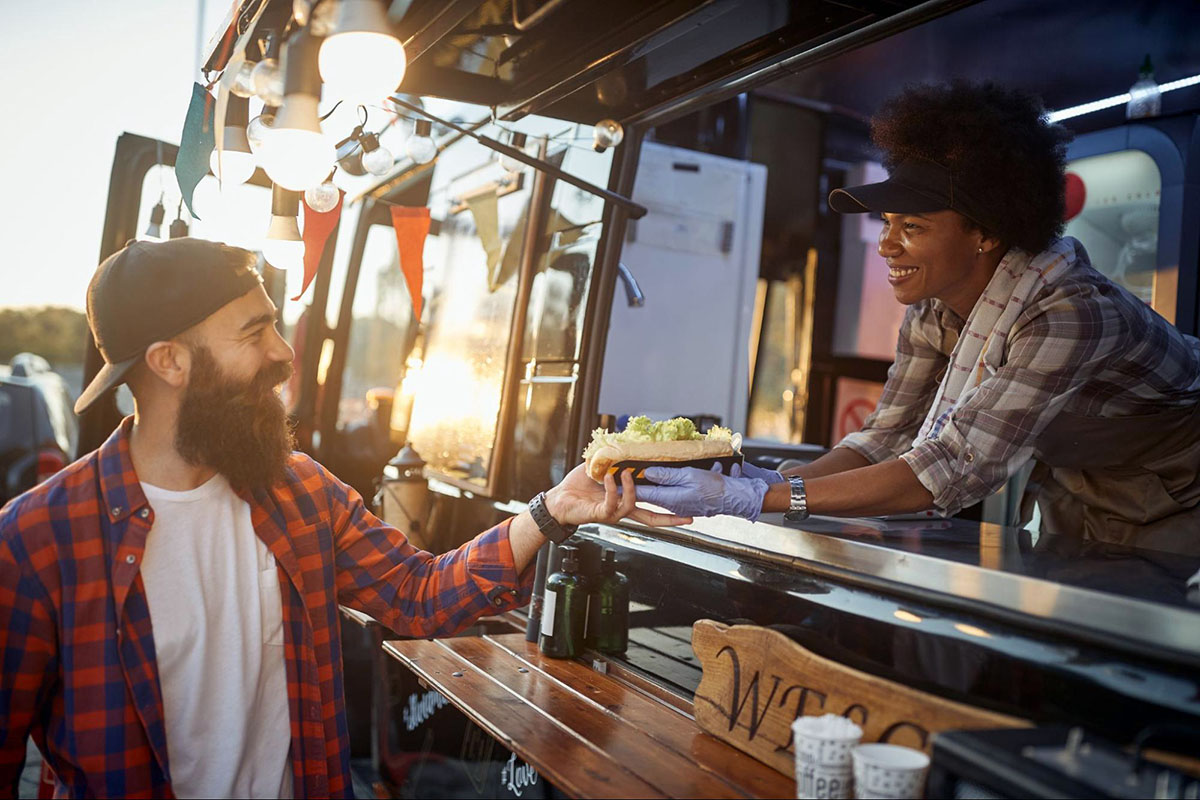How to start a food truck business in 7 steps
If you’re passionate about the food industry, becoming a food truck owner could be a good foray into the field. Thanks to minimal start-up costs and the ability to pursue a wider target market, running a mobile business is a more flexible and lower-risk venture than opening a brick-and-mortar restaurant business. Here’s what it takes to get your food truck business up and running.

How to start a food truck business
The food truck industry is worth over $1 billion and steadily growing in value each year. To capitalize on growing demand, follow this step-by-step guide to start your journey as a food truck business owner.
1. Find your niche
Launching a successful food truck requires you to differentiate your business idea from the competition—both brick-and-mortar restaurants and other mobile offerings. Consider how the type of food—and service—you provide will help you stand out. Perhaps you run the only Ethiopian food truck in your market, or maybe you’ve mastered one unique menu item, such as an ice cream taco.
Make sure the kind of food and service you provide addresses a specific need or target market. For example, if you’re skilled at making classic burgers, but another local food truck already serves them, differentiate yourself by using unique ingredients, such as an all-vegan menu.
2. Build your food truck business plan
Once you know where your business is headed, start writing a business plan—the roadmap for your business. This plan should include a business description that defines your target audience and explains what your food truck sells, how it operates, and what makes it successful.
Include your business name, which should align with your food truck concept and clearly distinguish you from other food businesses in your area.
On top of the basics about your food truck, your business plan should also include the following three elements:
Marketing strategy
Explain the key marketing strategies and channels you’ll use to promote your food truck to your target audience. For example, you might create a Yelp Business Page to reach people actively looking for food in your area. 97% of people make a purchase after visiting Yelp, so it can be a powerful tool to drive business to your food truck. If your schedule changes often, you can also use social media marketing to reach potential customers and let them know where they can find your truck on any given day.
Food truck startup costs

List all of the expenses that you’ll need to launch your food truck, including one-time startup costs, such as your new truck. Next, list three to six months of recurring operating expenses: your point-of-sale subscription (also called your POS system), gas, ingredients, truck maintenance, and business insurance.
Financial projections
Work with a financial analyst or accountant to forecast your food truck’s growth over the next five years. Include cash flow and income statements that demonstrate your business’ profitability to lenders. Even if you’re not applying for a business loan, this will help you create financial milestones and budget for the future.
Get found for free
Show up for any of the millions of customers on Yelp searching for a business like yours.

3. Register your food truck business
To legally operate your new business, you’ll need to register with your state agency. You can complete this process online or at your agency’s physical location. Expect to pay a filing fee, which is under $300 in most states.
Food truck businesses might need to take a few extra steps to ensure compliance. As part of the business registration process, you must provide the address of a registered agent who is available to receive legal documents on your behalf during business hours. Since your food truck won’t have an address, you might need to hire a registered agent service, which typically costs less than $150 per year. A registered agent service will ensure you get important legal notices—like those for lawsuits or from the IRS.
Many food truck businesses—including those with employees or those that operate as corporations or partnerships—are also required to apply for an Employer Identification Number (EIN). An EIN is a type of tax ID number for businesses provided by the IRS. Although it’s not necessary to operate legally, many banks require you to have an EIN in order to open a business bank account or get a loan.
4. Obtain business licenses and permits
Food truck businesses often require several licenses and permits to operate. Start by researching the business licenses and permits required of food trucks in your region through your state, county, or city’s Department of Revenue or Secretary of State. Food truck owners commonly need to obtain food service licenses, which require inspections from local health departments and can cost between $100 and $1,000. Your state health department website will have exact fees posted for your specific location.
In some cities, you’ll also need a fire certificate, which requires an inspection from your local fire department, as well as a parking permit to operate. Food handler permits are also typically required of every employee to ensure you meet food safety standards.
You can contact your local Small Business Administration (SBA) office if you need help finding the right licenses and permits.
5. Get the financing you need

While launching a food truck tends to be more affordable than launching a brick-and-mortar restaurant, your startup costs can still range between $50,000-$60,000. If you don’t have enough cash to cover your startup expenses, outside financing will be critical. Some options to consider include:
- Crowdfunding from friends, family members, and your community
- Getting a business loan from your bank or other lenders
- Applying for a business credit card
If you’re struggling to get the funds you need, explore ways to stay on budget as you pursue your small business endeavor. For example, you might purchase a used truck instead of a new one.
6. Identify your food truck location
Once you’ve obtained your food truck, you can start scouting for places to operate. Operating at set locations on a consistent schedule will help you build a loyal customer base. For example, you can rotate between weekly farmer’s markets or partner with local offices and businesses. Some cities or states, such as Los Angeles County, require you to report a set schedule and route to your local health department.
If you want to operate at official events, such as festivals or sporting events, you might need to pay a food vendor fee when you apply for the event. Events can charge in various ways, including:
- Fixed fee
- Percentage of sales
- Percentage of sales plus a fixed fee
- Feed the event crew
- Donate to charity
You might also need to pay a power fee for electricity. Each event will have its own set of rules and regulations, so be sure to read the application and terms carefully.
If you’re running a food truck on a city street, be sure to check for zoning regulations in your area. New York City, for instance, has restricted streets for food truck operators.
7. Market your food truck business
Your food truck business may come and go on city streets, but you want to create a lasting impression with customers. Marketing can help you promote your business and reach customers who are already interested in your menu items.
Using the general marketing strategies from your business plan, come up with specific tactics to draw in customers. For example, you can run a referral contest on your social media accounts, in which people can enter a drawing for two free meals by tagging a friend.
Be sure to take great photos to post to your social media accounts and Yelp Business Page to make the biggest impact.
Get more leads
Reach more customers with placements on search and competitors' pages.

Bring your own food truck to life
If you’ve dreamed of becoming an entrepreneur in the food industry, starting a food truck can be a more affordable alternative to opening a restaurant. This type of business allows you to avoid the cost of renting and renovating a brick-and-mortar while providing you the flexibility to reach your target market right where they are.
Once you’re up and running, add or claim your Yelp Business Page to engage with customers and strengthen your online reputation.